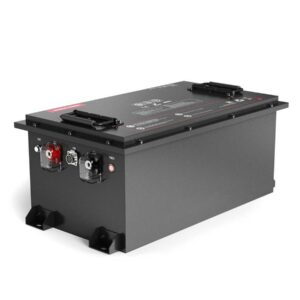
Which batteries are better alkaline or non alkaline?
Alkaline batteries excel in high-drain devices like digital cameras and gaming controllers due to their higher energy density (1.5V) and longer shelf life (5–10 years). Non-alkaline options like carbon-zinc batteries are cheaper but offer 30–50% less capacity, while rechargeable Li-ion/NiMH batteries suit frequent users despite higher upfront costs. Choose alkaline for intermittent-use electronics and rechargeables for daily devices.
Carbon Zinc Batteries vs Alkaline Batteries: Which Is Better?
What distinguishes alkaline from non-alkaline batteries?
Alkaline batteries use potassium hydroxide electrolyte and zinc/MnO₂ electrodes, delivering 1.5V with 2,500–3,000mAh capacity. Non-alkaline types include carbon-zinc (1.5V, 500–1,000mAh) and lithium primaries (3V). Pro Tip: Alkaline’s 0.9V cutoff voltage ensures 80% capacity utilization vs. carbon-zinc’s 0.7V abrupt drop.

Alkaline chemistry maintains stable voltage under moderate loads—ideal for wireless mice or remote controls. Carbon-zinc batteries, using ammonium chloride electrolyte, suffer voltage sag in high-drain devices. For example, a 100-lumen flashlight lasts 8 hours on alkaline but only 3.5 hours on carbon-zinc. Warning: Never mix alkaline/non-alkaline cells in series—voltage mismatches cause reverse charging risks.
When should I choose non-alkaline batteries?
Opt for carbon-zinc in ultra-low-drain devices like wall clocks (10µA draw) or lithium primaries in extreme temperatures (-40°C to 60°C). Rechargeable NiMH/Li-ion suit daily-use gadgets despite lower 1.2V nominal voltage.
Carbon-zinc’s 2-year shelf life makes them cost-effective for emergency backups. In sub-zero conditions, lithium iron disulfide batteries outperform alkalines by maintaining 90% capacity. Pro Tip: Use lithium primaries in smoke detectors—they last 10 years vs. alkaline’s 5-year maximum. Transitional devices like LED candles benefit from lithium’s flat discharge curve.
| Battery Type | Cost (AA) | Cycle Life |
|---|---|---|
| Alkaline | $0.50 | Single-use |
| NiMH | $3.00 | 500+ |
| Lithium | $2.00 | Single-use |
How do environmental impacts compare?
Modern alkaline batteries contain <0.025% mercury—safe for landfills in most regions. Rechargeables offset 50kg CO₂ per 1,000 cycles but require proper recycling for nickel/cobalt recovery.
Though 90% of alkaline components are recyclable, only 3% get processed globally. A NiMH battery replaces 300 disposables, reducing zinc mining by 1.2kg per user annually. For example, Sweden’s battery recycling program recovers 47% of sold batteries through retailer take-back systems. Practically speaking, pairing solar chargers with NiMH batteries creates a closed-loop solution for outdoor gear.
Battery Expert Insight
FAQs
Can alkaline batteries leak?
Yes, especially if stored in devices beyond 2 years. Potassium hydroxide electrolyte crystallizes, corroding contacts—remove batteries during long storage.
Are lithium batteries alkaline?
No, lithium primaries use organic electrolytes. They’re 40% lighter than alkaline AAAs and maintain voltage better in cold environments.
How to Safely Dispose of and Recycle Car Batteries
Which is better, alkaline or non-alkaline batteries?
Alkaline batteries are ideal for low-drain devices due to their affordability and long shelf life, while non-alkaline batteries, such as lithium types, excel in high-drain devices with higher energy density, longer lifespan, and better performance under extreme temperatures. The choice depends on your device’s power demands.
What is the disadvantage of an alkaline battery?
Alkaline batteries perform poorly in high-drain devices, may leak if left discharged, and are bulkier than some alternatives. They also cannot be recharged, which can increase long-term cost for frequent use.
Why are alkaline batteries better?
Alkaline batteries offer longer shelf life, consistent low-drain performance, and safer disposal compared to some non-alkaline types. They are cost-effective for everyday devices like remotes, clocks, and flashlights.
When should you not use alkaline batteries?
Avoid alkaline batteries in high-drain electronics such as digital cameras or gaming controllers, where they may deplete quickly, reduce performance, or leak, potentially damaging the device.
Do alkaline batteries last longer than regular batteries?
Yes, alkaline batteries typically last up to five times longer than zinc-carbon “regular” batteries of the same size, making them more reliable for devices with moderate energy needs.
Can alkaline batteries be used in extreme temperatures?
Alkaline batteries are less effective in extreme heat or cold compared to lithium or other non-alkaline batteries, which maintain performance and energy output across a wider temperature range.
Are non-alkaline batteries more expensive than alkaline ones?
Yes, non-alkaline batteries, particularly lithium types, have a higher upfront cost but offer longer life, better performance in high-drain devices, and lighter weight, which can offset the initial expense.
Where can I get high-quality non-alkaline batteries for industrial use?
LiFePO4 Battery Factory, powered by Redway Battery, provides OEM lithium solutions for cars, forklifts, and golf carts. Their batteries offer long life, high performance, and reliable factory pricing for businesses needing bulk or customized orders.
If you want, I can also create a table comparing alkaline vs non-alkaline batteries for quick reference suitable for your website or blog. Do you want me to do that?
